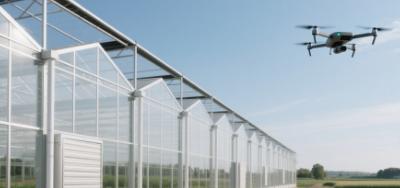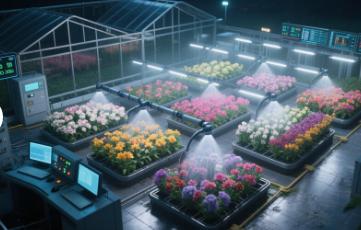Hey there! Let's dive into the world of smart greenhouses, the shining stars of modern agriculture and the brains behind the scenes.
Precision Control for Customized Crop Growth
Picture this: plants living in a "smart mansion" where temperature, humidity, light, and CO₂ levels are all precisely managed. Sensors constantly gather data from inside the greenhouse and send it to a central control system. If the temperature rises, the ventilation fans kick in. If the humidity drops, the humidifiers start. If there's not enough light, the grow lights turn on. And if CO₂ levels are low, the CO₂ generators get to work. In this customized environment, tomatoes, for example, see their growth cycle shortened, yields boosted by 30% to 50%, and fruit quality significantly improved.
Automated Systems for Effortless Efficiency
Smart greenhouses have automated systems that are the epitome of hard work. Irrigation, fertilization, and climate control are all handled with ease. Soil moisture sensors detect when the soil is too dry and automatically activate the irrigation system, delivering just the right amount of water to avoid waste. The fertilization system is equally smart, adjusting the type and amount of fertilizer based on soil nutrients and crop needs, delivering it directly to the plant roots through the irrigation system. The climate control system links various devices to keep the greenhouse climate in optimal condition. This not only increases crop growth efficiency but also reduces manual labor and lowers production costs.

Green and Effective Pest and Disease Control
Smart greenhouses go all out in pest and disease control. They use a comprehensive strategy that combines physical, biological, and chemical methods, along with advanced technologies like leaf moisture monitoring and image recognition, to detect and prevent pests and diseases early on. Once an issue is spotted, the system automatically takes action, such as releasing biological control agents or turning on UV sterilization devices. This reduces pesticide use and residue, minimizes crop damage from pests and diseases, and ensures healthier, greener produce.
Sustainable Agriculture through Resource Recycling
Smart greenhouses are also role models in sustainable agriculture. When it comes to water conservation, precise irrigation control and integrated water and fertilizer management significantly improve water use efficiency and allow for rainwater collection for irrigation. For energy savings, high-performance insulation materials and smart temperature control systems reduce energy consumption. Resource recycling is another highlight, with treated wastewater reused for irrigation and waste materials composted into organic fertilizers that go back into the soil. This lowers operating costs and environmental impact, making agriculture greener and more sustainable.

Smart greenhouses are not just a technological marvel but also a practical solution for modern farming. They offer precise control, efficient automation, effective pest management, and sustainable practices that boost crop yields and quality while reducing costs and environmental footprint. As we look to the future of agriculture, smart greenhouses are undoubtedly a key part of the solution.
Welcome to have a further discussion with us.
Phone: +86 15308222514
Email: Rita@cfgreenhouse.com
Post time: Jul-15-2025







 Click to Chat
Click to Chat